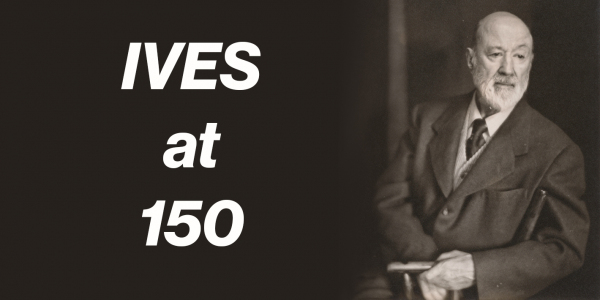Latest News
Ives Music: Alive and Kicking
Posted October 24, 2024
Ives Music: Alive and Kicking

By Jamie Bernstein
My introduction to Charles Ives came, not surprisingly, through a Young People’s Concert. My father had a perfect instinct for the elements in Ives’s music and life story that would appeal to his young audience – and I was hooked on Ives at an early age.
Everything about Charles Ives is unusual. He was a prosperous insurance executive from Danbury, Connecticut -- in other words, he was a composer in his spare time. And yet, Ives's unique, iconoclastic compositions wound up having an enormous impact on 20th Century American composers. My father explained: “[He] was a part-time composer. . . but somehow in his half-amateur inspired way, he was able to produce music that was not only full of American flavor, but music that also predicted many of the new, startling sounds that were later to become everyday stuff in what we now call ‘modern’ music. Ives was a pioneer, a prophet, and a patriot -- a real old-fashioned American individualist, like Emerson and Thoreau.”
In the mid-1890’s, Ives studied at Yale with the composer Horatio Parker. Professor Parker was magnificently old-school: he immersed his students in the works of the great German composers – especially the symphonies of Beethoven and Brahms. But every rule of the 19th century symphonic tradition that Charles Ives dutifully learned, he also eventually broke.
Charles's father, George Ives, was a band leader, so Charles grew up hearing the sounds of parades, camp meetings and bandshell performances, featuring all the tunes a person was likely to hear in those places. Ives absorbed all those folk tunes, hymns and popular ditties he'd heard since childhood, and often used them as building blocks in his compositions. As my own dad had explained in a Young People’s Concert: “It was [Ives’s] way of being American: to take marching tunes and hymns and patriotic songs and popular country fiddle music and develop them all together into big symphonic works.” Charles Ives was indisputably one of America’s most truly original composers, yet he also gleefully borrowed music from all over the place – and nowhere more than in his Second Symphony.
A few years ago, conductor Charles Prince invited me to create a narration for a performance of Ives’s Second Symphony. I’d already learned from my dad about all those borrowings of traditional American tunes, but now I had the chance to take a deeper dive. I marveled at the endlessly inventive ways Ives found to incorporate those melodies. We can hear transmogrifications of everything from "Columbia the Gem of the Ocean" to “Turkey in the Straw” to "America the Beautiful" and way, way beyond.
As part of my narration, I employed placards with the names of the various tunes quoted in the symphony, to help the audience recognize the tunes whenever they appeared. But in the fourth and final movement, I wiped out completely. The melodies are so ingeniously and prodigiously intertwined that I couldn’t keep up – and my placards tumbled all over the stage. I’m certain Ives would have loved it.

Although Ives completed his Second Symphony in 1901, it wasn't performed until 1951, when my dad conducted it with the New York Philharmonic. This was one of the many ways Leonard Bernstein helped to put Charles Ives where he deserved to be in the pantheon of 20th Century American composers.
Ives was 77 by the time his Second Symphony had that 1951 premiere at Carnegie Hall -- 50 whole years after he'd composed it. By then, Charles Ives had become a full-blown curmudgeon who had grown thoroughly and justifiably annoyed by the music world's lack of respect for his innovative approach to composition. He declined to attend the premiere. But friends and family members finally persuaded him to at least listen to the radio broadcast at a neighbor's kitchen. What he heard so elated him that, according to my father, Charles Ives went home and – cut off his beard. I guess at the age of 77, that could be the equivalent of kicking up your heels and yelling "Wahoo!!"
Bernstein took Ives along everywhere in the world he conducted – including the New York Philharmonic's historic tour to the USSR in 1959. Toward the end of my father’s life, he brought Ives's Symphony no. 2 to the Bavarian Radio Symphony, where he preceded the recorded performance with a talk about the piece’s ingenious interweaving of new and old elements. (He should have used placards!)
Perhaps the most iconic Ives piece, which my father also introduced to his Young People’s Concert audience, is The Unanswered Question. It’s such great music for kids – because even if you don’t get it on a philosophical or musical level, it’s still somehow so legible. As my father described it, “naïve and profound at once.” I remember being mesmerized by that solo trumpet sending its lonely message out into the infinite universe of sustained strings, and the strange, increasingly garbled responses from the woodwinds. As an adult, I still find the piece to be pure magic – and apparently my dad felt the same way. After all, he named his Charles Eliot Norton Lectures at Harvard after the piece, and he delved into the work itself as part of the fifth lecture. Leonard Bernstein felt strongly that, whether intentionally or not, Ives was making a statement about music itself – what my father called “the dilemma of the new century” -- that is, the struggle of tonality to compete with the rise of 12-tone music. In fact Bernstein devoted the entirety of his six lectures to the exploration of that dilemma, by drawing an extended analogy between the physical laws of music and those of Chomskyan linguistics. My father was euphorically in over his head with this colossal inquiry – and it was Charles Ives who provided him with both context and conclusion. The last words in the sixth and last lecture of what constituted my father’s apologia for tonality, were these: "And finally, I believe… Ives's Unanswered Question has an answer. I'm no longer quite sure what the question is, but I do know that the answer is Yes."